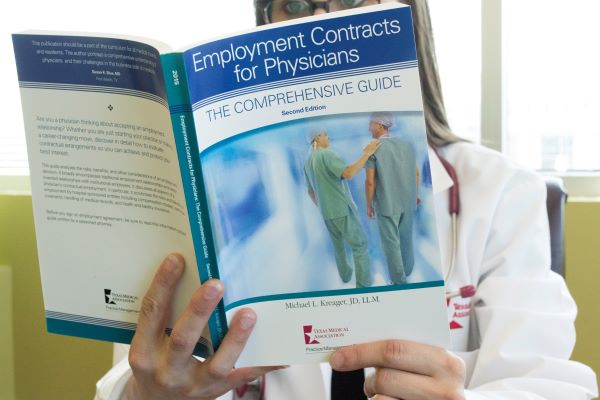
Priority: Improve parameters of noncompetes such that they balance employed physicians' ability to practice medicine and promote continuity of care, while respecting employer physicians' ability to protect legitimate business interests.
Background: Over the past few years, the Texas Medical Association has evolved a policy on noncompete agreements that factors the spectrum of physician practices into the equation.
“The goal here is to protect the physician employees, so they don’t have to disrupt their entire life just to change jobs, and protect the physician employer, smaller groups or larger groups, because there are all kinds of economic costs associated with running a practice,” said Tilden Childs, MD, immediate past chair of TMA’s Council on Legislation.
Nationally, anywhere from 37% to 45% of physicians operate under noncompete clauses in employment contracts, according to American Medical Association data. While nearly three in four Texas physicians are now employed, compared to 56% just five years ago, many TMA members still maintain independent practices and operate as both physicians and employers of other physicians.
Greg Fuller, MD, who runs a family medicine office in Keller, emphasizes that he and his staff invest considerable time and resources to get a newly hired physician onboarded and credentialed with insurance companies. “There’s significant value in that,” he said.
Patients also figure into TMA’s approach to noncompete agreements.
“Everything [TMA does] is based on what’s best for the public,” said Dr. Childs, pointing out that allowing doctors to practice after separating from an employer – without having to move a great distance to satisfy a geographic restriction – also helps patients maintain care continuity and established relationships with their physicians of choice.
In 2023, TMA worked to ensure companion bills by Sen. Charles Schwertner, MD, (R-Georgetown) and Rep. Greg Bonnen, MD, (R-Friendswood) balanced the needs of both employer and employee physicians. Their plan passed the Senate but stalled in the House before the last legislative session ended.
The upcoming session also begins just five months after a federal judge in Texas blocked a Federal Trade Commission (FTC) final rule banning certain noncompetes that was to take effect on Sept. 4, 2024.
In its final rule statement, FTC sought “to promote competition by banning noncompetes nationwide, protecting the fundamental freedom of workers to change jobs, increasing innovation, and fostering new business formation.”
That final rule is now in limbo as of this writing, but Texas could still pass a law articulating more specific guidelines for noncompetes before federal guidance is fully clarified.
Furthermore, FTC’s final rule largely exempts nonprofits. That means, even if the government agency won an appeal and could put it into place as written, “there’s still room for Texas to act,” said Michelle Romero, TMA associate vice president of public affairs.
Per 2022 data from the American Hospital Association, nearly 30% of Texas hospitals (152 of 509) are nonprofit, compared with 260 for-profit and 97 state and local government-run hospitals.
Solutions: TMA articulated an even clearer vision for legislation this past October, when Dr. Childs testified before the Texas Senate Business and Commerce Committee, chaired by Senator Schwertner, who is expected to introduce legislation similar to his 2023 bill.
Dr. Childs recommended “strik[ing] a reasonable balance between the employer’s interests and the interests of the employee and the public.”
Specifically, the Fort Worth radiologist shared TMA’s three key recommendations for noncompete clauses, which were recently adopted into TMA policy by the House of Delegates, to include:
- Time limitations that do not extend beyond a year post-employment;
- Geographic scope limitations to a catchment area of 75% or less of the patients at the practice location where the physician worked and not each of the practice’s locations; and
- Clear exceptions outlined for circumstances involving the public interest, including physicians serving in medically underserved areas or in specialties with a critical shortage.
“Noncompetes have traditionally been regulated by state legislatures,” Dr. Childs testified. “TMA strongly contends there is both the need and the authority for the Texas Legislature to impose these additional parameters regarding physician noncompetes.”
TMA shares Senator Schwertner’s goal to protect independent physicians from the negative consequences of noncompetes, says Clayton Stewart, TMA vice president of legislative affairs.
At the same time, especially in the face of rapid and competitive health care consolidation, “some independent and private practices use these [noncompetes] to prevent their physicians that they have in their practice from getting poached by [larger] organizations. So, it’s threading a needle,” he said.
TMA’s Top 10 Priorities for the 2025 Legislative Session
– Develop a noncompete agreement law that works for all physicians
Phil West
Associate Editor
(512) 370-1394
phil.west[at]texmed[dot]org

Phil West is a writer and editor whose publications include the Los Angeles Times, Seattle Times, Austin American-Statesman, and San Antonio Express-News. He earned a BA in journalism from the University of Washington and an MFA from the University of Texas at Austin’s James A. Michener Center for Writers. He lives in Austin with his wife, children, and a trio of free-spirited dogs.